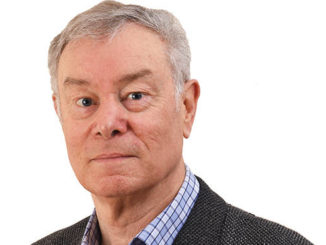
We were very sorry to learn of the death of noted historian Michael Bliss, long-time Leaside resident and Leaside Life contributor. We were very fortunate to have him grace our publication for so many years with his witty takes on life in Leaside. He will be missed. —Editor
Allan Williams’ Leaside Life profile of Bliss appeared in 2013. It is reprinted here in an edited version.
One of Canada’s best-known and most prolific historians is a Leasider.
In fact, Michael Bliss and his wife Liz, who marked their 50th wedding anniversary [in 2013], have lived in Leaside all their married life, first in Thorncliffe Park (which was part of the Town of Leaside at the time), then on Macnaughton Rd. and, since June 1973, on Bessborough Dr.
The couple’s three children, a son and two daughters, all attended Leaside schools and played minor sports. “I did my share of coaching,” Bliss recalls. “I umpired boys basketball, coached girls softball and girls hockey too – both our daughters played at Leaside Gardens.” All three children are now married with children of their own; two are lawyers in Vancouver, the third a school teacher in Toronto.
“We’ve been very happy in Leaside,” Bliss says. “I see it as a small town in the middle of a great city where we have the best of both worlds.”
Michael Bliss grew up in Kingsville and says he always loved books, and knew as a boy that he wanted to write them one day. But he studied science and philosophy at UofT, taught school for two years at Lawrence Park Collegiate – and got married – before committing to a career in History. The late 1960s was a time of rapid expansion on Canadian campuses and he was hired by the University of Toronto’s History Department even before finishing his doctorate.
While Bliss liked teaching, it was the book projects he’s enjoyed most. “Both working in the archives and writing in my study are a kind of time-travel, a constant dialogue with the sources,” he says. “A long day’s work writing history can be very satisfying.”
He’s written about Canada’s business and political history, and is best-known to Canadians for his frequent appearances on television and in newspapers as a commentator, especially during the constitutional debates of the 1980s and ’90s.
But it is to medical history that he has devoted most of his time and energy. His most enduring book has been The Discovery of Insulin, which tells the fascinating story of Banting and Best, their teamwork and rivalry leading to the discovery in Toronto in 1922 that offered diabetics a chance to live a relatively normal life. The book is still in print after more than thirty years and has been translated into six languages. Bliss is still asked to give talks on the subject.
Biographies of two medical pioneers, Canadian Sir William Osler, “the father of modern medicine,” and American Harvey Cushing, the founder of modern neurosurgery, published in 1999 and 2005 respectively, were well-received and unlikely to be superseded. They certainly classify as the big, heavy books he dreamed of writing.
He still keeps busy. He’s working with the Macdonald-Laurier Institute promoting intelligent debate on historical and contemporary issues. He serves on the Board of Trustees of the Museum of Civilization in Ottawa which [has transformed] into the Museum of Canadian History with galleries scheduled to open in time for Canada’s 150th birthday. “For the first time Canada is going to have a national museum of its history and for an historian this is really exciting.”
He also published his memoirs in 2011, Writing History: A Professor’s Life, a very engaging and enjoyable read.
Recently, he was involved in attempts to save the back campus at U of T from being converted to Astroturf. Despite city council approval earlier this summer, Bliss says the battle isn’t over: “We’ve lost for now – it’s a shameful thing for the university to do – but we’ll not rest until we have real grass back on our campus!”
“I’ve been blessed with a long life, good health and a lot of energy,” says Bliss, “and I hope to be around for a while yet. I plan to write a new preface for a centennial edition of The Discovery of Insulin [in 2022].”




